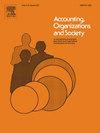Recent regulatory and professional developments have increased the frequency with which public accountants interact with professionals from other accounting firms. Archival findings in accounting indicate that when the same firm provides both audit and non-audit tax services, audit quality is better than when different firms provide these services, which is attributed to differential communication of audit knowledge, or a “knowledge spillover” effect that occurs between professionals from the same firm. However, empirical research that examines how information is communicated across engagement teams is limited. Using social identity theory, we predict that the communication decisions of accounting professionals could be biased when multiple firms perform accounting services and that this has potential negative implications for audit quality. We conduct an experiment in settings where professional services are split across different accounting engagement teams and find that both tax and audit professionals are more likely to disclose information about possible financial statement errors to auditors from their own firm compared to those from a rival firm. We also find that tax professionals are more willing to communicate errors to a client when another firm is responsible for the error compared to their own firm, but we do not observe this effect for auditors. We believe that these results have important implications for audit quality and provide new insights into the effects of inter-firm collaboration of accountant knowledge sharing.


